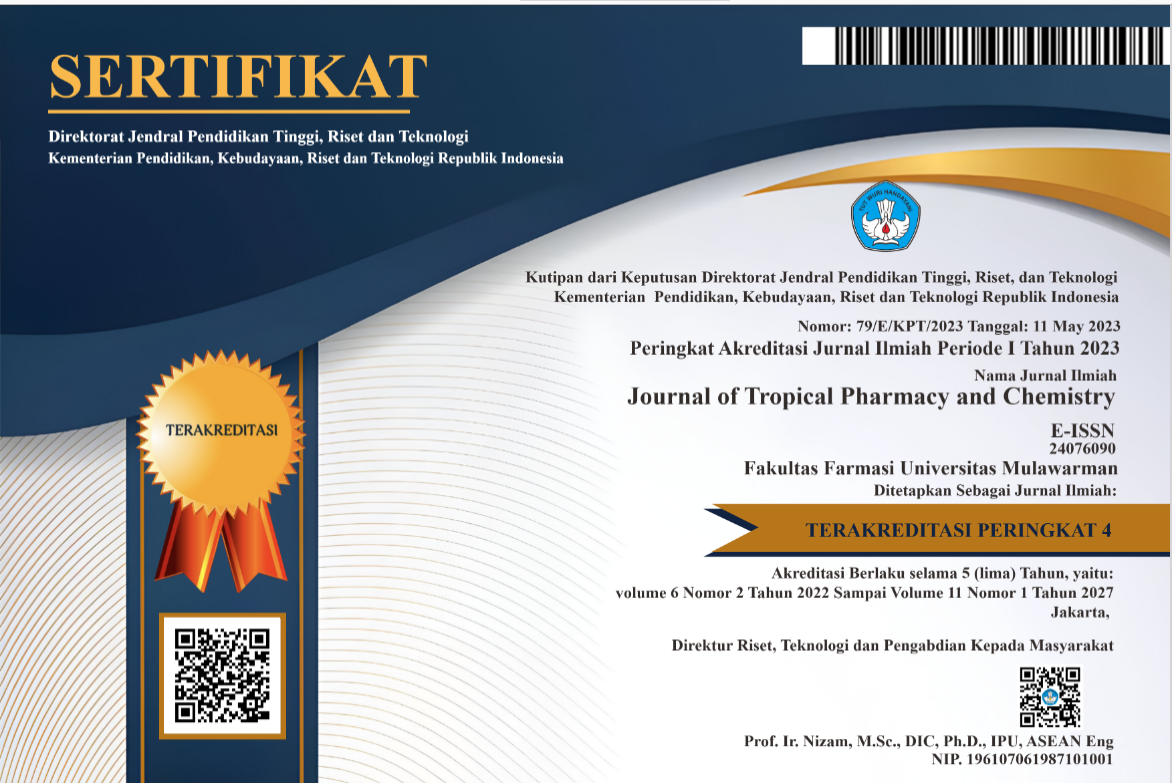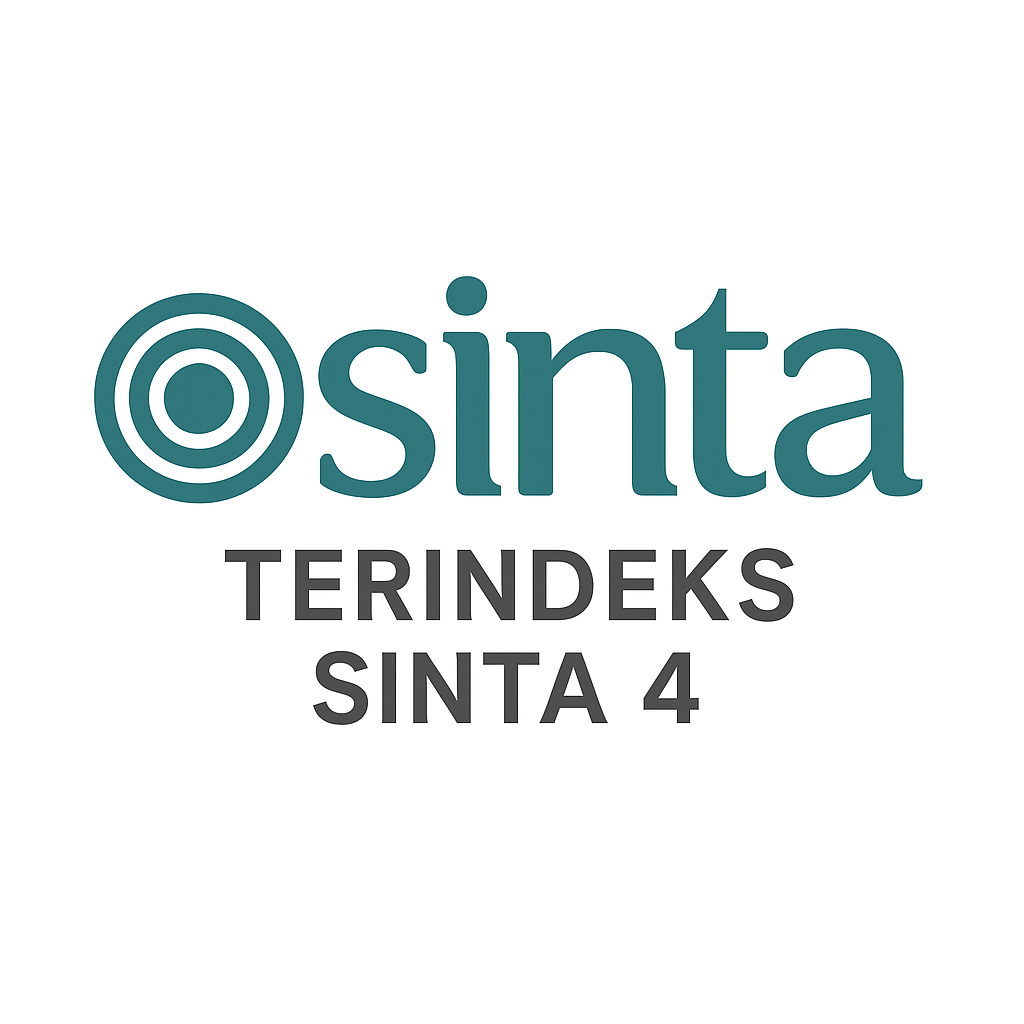Aktifitas Antimikroba Ekstrak Fraksi n-Heksan Daun Sungkai (Peronema canescens. JACK) terhadap Beberapa Bakteri dengan Metode KLT-Bioautografi
Keywords:
Sungkai leave, fractination, microbial, bioautog raphy-TLCAbstract
Infectious diseases are still a serious problem in Indonesia, as well as the more widespread microbial resistance to antibiotics available. Traditional medicinal plants known potential to be developed as a source of infectious disease treatment is Sungkai Plant (Peronema canescens. Jack). This study aims to determine the antimicrobial activity of leaf extracts of n-hexane Sungkai with KLT-bioautografi method against some microbial testing. Microbial testing is used as much as 3 types of gram-positive bacteria that is Basillus subtillis, Streptococcus mutans and Staphylococcus aureus. The extraction method used to get the n-hexane fraction obtained from liquid-solid partition using n-hexane. Preliminary research conducted by the screening test n-hexane extract of the solid dilution method with DMSO as a negative control. Preliminary results obtained n-hexane extract gave growth inhibition against all the test bacteria at levels of 1 mg / ml. while the antibacterial activity of the test results-bioautografi TLC method showed some active spots with a diameter of clear zone and a different price Rf. Active spot detection using stain apparition UV 254 nm, 366 nm and 10% H2SO4 spray reagent. Active Spot-bioautografi KLT test results obtained by the four active spots on three types of bacteria that test B. subtillis, St. mutans and S. aureus with Rf value detection results reagent H2SO4 10%, respectively each is Rf 0.75 cm with brown spots, Rf 0, 68 cm purple, brown Rf 0.29 cm and Rf 0.21 cm brown.
Downloads
References
1. Djide. N., M. 2010.Mikrobiologi Farmasi. Jurusan Farmasi F.MIPA. Universitas Hasanuddin. Makassar. 45-47.
2. Hertiani,T., Palupi, S.I., Sanliferianti, dan Nurwindasari, D.H., 2003,Uji Invitro Antimikroba Terhadap Staphylococus aureus, Eschericia coli, Shygella dysentriae dan Candida albicans Dari Beberapa Tanaman Obat Tradisional Untuk Penyakit Infeksi. Jurnal Farmasi Indonesia Pharmacon. Volume 4 (2), Desember 2003. 89-95
3. Houghtin, P.J., Raman, A. 1998.Laboratory Handbook for the Fractinatio of Natural Extrack. Chapman & Hall. 6-7
4. Ibrahim, A., 2011.Aktivitas Antimikroba Ektrak Daun Rami (Boehmeriavirgata (Forst.) Guill terhadap Beberapa Mikroorganisme. Journal of Tropical Pharmacy and Chemistry. Vol. 1 No. 2 : 86-93)
5. Mardi. 2010.Koleksi Herba Institut Penyelidikan dan Kemajuan Pertanian Malaysia. (Online). http://wannura.wordpress.com). diakses tanggal 12 Juni 2011
6. Mathias, O., Hamburger and Geoffrey A. Cordell., 1987.A Direct Bioautographic Assay for Compounds Possessing Antibacterial Activiity. Journal of Natural Products. Vol. 50. No.1. 19 - 22.
7. Murningsih, T., Subeki., Matsuura, H., Takahashi, K., Yamasaki, M., Yamato, O., Maede, Y., Katakura, K., Suzuki, M., Kobayashi, S., Chairul., Yoshihara, T.
2005.Evaluation of Inhibitory Activities of The Extracts of Indoneisan Traditional Medical Plants Againts Plasmodium falciparum and Babesia gibsoni. J. Vet. Med. Sci., 67, 8: 829-31.
8. Subeki., Matsuura, H., Yamasaki, M., Yamato, O., Maede, Y., Katakura, K., Suzuki, M., Trimurningsih., Chairul., Yoshihara, T., 2004.Effects of Central Kalimantan Plant Extracts on Intraerythrocytic Babesia gibsoni in Culture.
J. Vet. Med. Sci., 66, 7: 871-4
9. Suwandi, D. 1995.Uji Pendahuluan Ekstrak Etanol Daun Sungkai (Peronema canescens Jack) Terhadap Pertumbuhan Plasmodium berghei (ANKA) pada Mencit Putih Strain Swiss. Padang: Jurusan Farmasi FMIPA Universitas Andalas.
10. Strohl, W et al. 2001.Lippincott’s Illustrated Reviews : Microbiology. Lippincott Williams & Wilkins. A Walters Kluwer Company. Baltimore. Maryland. USA. 4.




